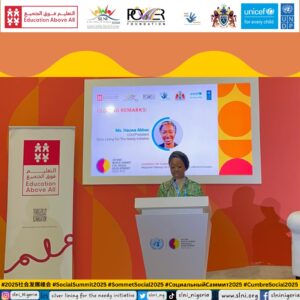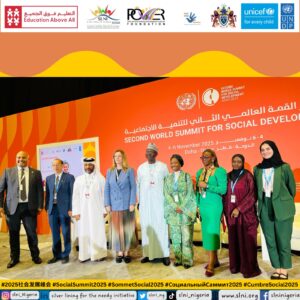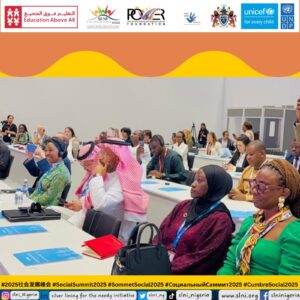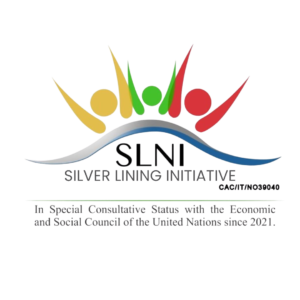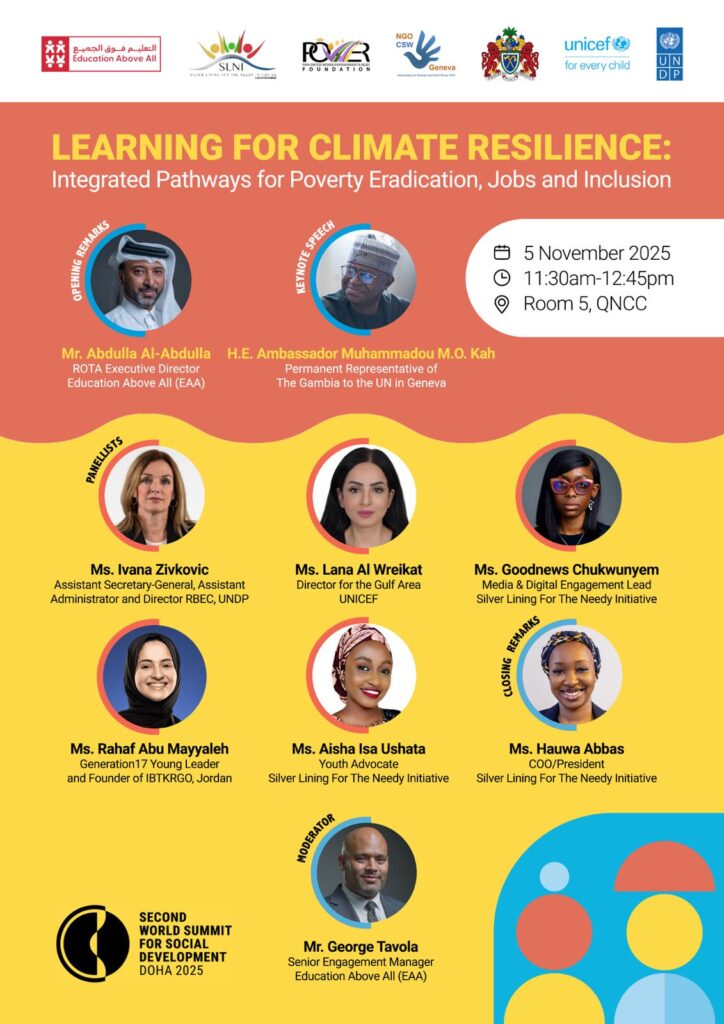
2nd World Summit For Social Development 2025
SLNI AND EAA IN COLLABORATION WITH POWER FOUNDATION CHAMPION CLIMATE-RESILIENT EDUCATION AT WSSD 2025
The Silver Lining for the Needy Initiative (SLNI) and The Education Above All Foundation (EAA) in collaboration with Papa Onyeze Women Empowerment and Relief (POWER) Foundation , hosted a high-level side event titled “Learning for Climate Resilience: Integrated Pathways for Poverty Eradication, Jobs and Inclusion” on the sidelines of the 2nd World Summit for Social Development (WSSD 2025) in Doha, Qatar.
Supported by UNDP, UNICEF, the Commission on the Status of Women (CSW), and the Permanent Mission of The Gambia to the United Nations, the event gathered global leaders, youth advocates, and development partners to explore how education, climate action, and community health can jointly drive resilience, job creation, and inclusive growth
Youth innovation was at the heart of the discussions. Ms. Aisha Ushata, Youth Advocate at SLNI, shared how youth-led health clubs are improving community health through climate-resilient hygiene practices while creating jobs for young people. She called for greater investment in youth leadership and local partnerships.
Ms. Goodnews Chukwunyem, SLNI’s Media and Digital Engagement Lead, underscored how training in technology and climate literacy equips youth to develop climate-smart livelihoods and respond proactively to risks.
“By empowering young people with knowledge and tools, we are building a generation that can respond proactively to climate risks,” she said.
Adding a regional perspective, Ms. Rahaf Abu Mayyaleh, UNDP Youth Representative, Jordan, contributed to the dialogue by addressing two key questions: What skills do youth need for the green economy and climate challenges? and How can governments support youth climate initiatives?
She emphasized that green economy readiness requires a blend of technical, entrepreneurial, and digital skills, alongside critical thinking and environmental stewardship.
“Youth must be equipped not only to adapt but to innovate within the green transition,” Ms. Abu Mayyaleh noted. “Governments can play a catalytic role by integrating climate education into national curricula, creating enabling policies for green startups, and funding youth-led climate solutions.”
In her closing remarks, Ms. Hauwa Abbas, SLNI’s COO and President, stressed that climate change is a development imperative requiring a human-centered approach. Quoting World Bank data that warns climate change could push over 130 million people into extreme poverty by 2030, she urged for greater investment in climate-smart education, early warning systems, and youth empowerment.
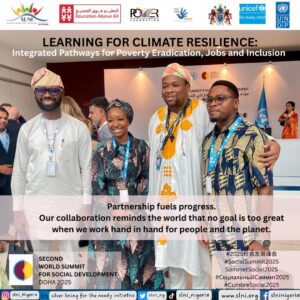
“Youth are not just beneficiaries but drivers of change,” she said. “By investing in climate-smart education and inclusive economies, we can build resilient, sustainable futures.”
Delivering a keynote, Ambassador Professor Muhammad Luka, The Gambian Ambassador to Switzerland and Permanent Representative to the UN in Geneva, emphasized the power of multilateral cooperation in addressing climate shocks.
“Across our continent, floods erase harvests overnight, yet this crisis reveals opportunity. Integrated learning for climate resilience is the bridge to empowerment,” he said, adding that embedding climate literacy and green skills could create 12 million decent jobs across Africa by 2030.
Mr. Abdulla Al-Abdulla, Executive Director of ROTA (EAA), and Mr. George Tavola helped frame the session, emphasizing the need for integrated, inclusive pathways linking education, climate resilience, and poverty eradication.
Speakers also highlighted that SLNI and EAA’s adult literacy and vocational training programs are helping rural families adapt to climate change through sustainable farming, renewable energy, and green technologies.
The session concluded with a strong call for multi sectoral collaboration and the implementation of the Doha Political Declaration, reaffirming global commitment to inclusive and climate-resilient development.
“The clock is ticking, and the world is watching,” Ms. Hauwa concluded. “Let us rise to the challenge and build a more resilient, inclusive, and sustainable future for all.”
